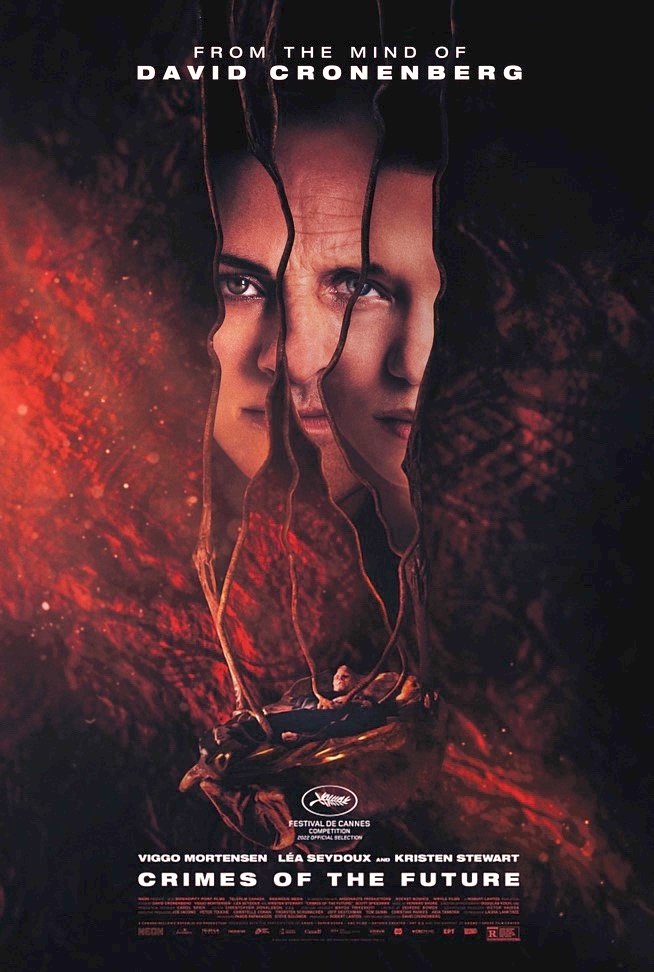 On the surface, scary movies seem rather basic. Like comedy, they only require a simple formula to work. A monster or killer plus victim equals gold. As these films have changed, it has taken on more philosophical aims. Subversion is the true nature behind what we fear. Works by Jordan Peele, Mary Harron and Alex Garland come to mind. The latter’s latest, Men, I failed to see before it left the theaters. However, another provocateur has made his return after a long hiatus.
On the surface, scary movies seem rather basic. Like comedy, they only require a simple formula to work. A monster or killer plus victim equals gold. As these films have changed, it has taken on more philosophical aims. Subversion is the true nature behind what we fear. Works by Jordan Peele, Mary Harron and Alex Garland come to mind. The latter’s latest, Men, I failed to see before it left the theaters. However, another provocateur has made his return after a long hiatus.
Canadian mind freak David Cronenberg felt as though he went into retirement after Maps To The Stars. But this year’s Cannes Film Fest featured his resurrection, coming back to what he does best. Body horror is a genre that uses breaking down and reconstruction of human forms as the basis for what frightens us. Think his 80s remake of The Fly or Mary Shelley’s Frankenstein, the originator with its morality tale of playing God by stitching a man together and bringing it to life. In Crimes of the Future the polar opposite is visualized.
Frequent collaborator Viggo Mortensen plays Saul Tenser, living in a future where pain and illness have been all but eradicated. Only cursed with a genetic disorder in which he creates new organs at whim, his assistant Caprice played by Lea Seydoux extracts them surgically as part of performance art. In fact, self-surgery is the norm, the new sex as one proclaims. This slogan professed by Kristen Stewart is very similar to James Woods’s line Long Live The New Flesh from this director’s own Videodrome. Not for the squeamish as all his works fall, it was shocking to sit in the theater while fellow spectators downed popcorn while watching Viggo’s abdomen get unzipped. All Cronenberg’s usual tropes of biometric machinery and horrific body modification are present. But at its heart is a film about how far we may push the environment before it pushes back. Flies buzz in and out of aural focus, a reminder of decay. A healthy dose of debate on transhumanism is also bandied about, namely by Stewart and her boss. All players give stellar performances but I only wished our director could have showed more than told. Or maybe he could have left us with an ending less abrupt, too many unanswered questions. But maybe that was the point.
Another film that ends abruptly but to great effect was Watcher, the first feature from Chloe Okuno. Her previous shorts showed a great eye for detail. That instinct works wonders here. As the film begins, we are introduced to Julia and Francis, a couple who have moved to Bucharest for his job. In the opening sequence they are shown into their new apartment, then the camera switches outside their window. The credits roll as we feel unsettled at the voyeuristic POV. A mood is established.
Subtle hints at danger get seasoned through, a serial killer terrorizing the city. Julia begins to suspect a man, one who is constantly staring into their building from across the street. But is this her imagination or is something up? Zach Ford’s script and the direction slowly ratchet up the tension while always leaving doubt in Julia’s mental state. Okuno uses her influences, namely Hitchock’s Rear Window and Polanski’s Repulsion, to craft an elegant thriller. The central role in actress Maika Monroe is on point, not her first rodeo in this genre. She broke out in 2014’s “It Follows,” but surpasses that here. A middle scene in a movie theater left me rattled; luckily my seat selection was in front of a wall. Hope to see more from this director in the future. Both films are currently in theaters and later this month on Video on Demand. Although not happy these are truly compelling viewing for you to check out, dear readers.




